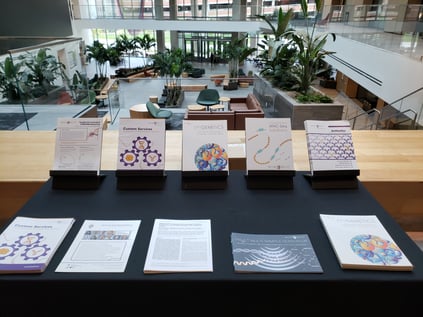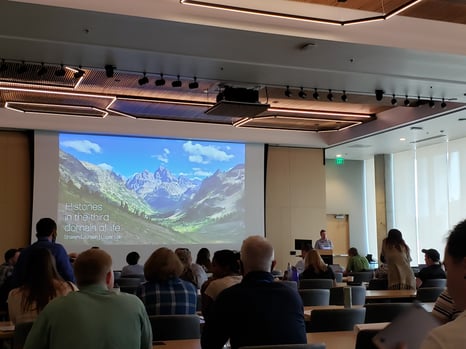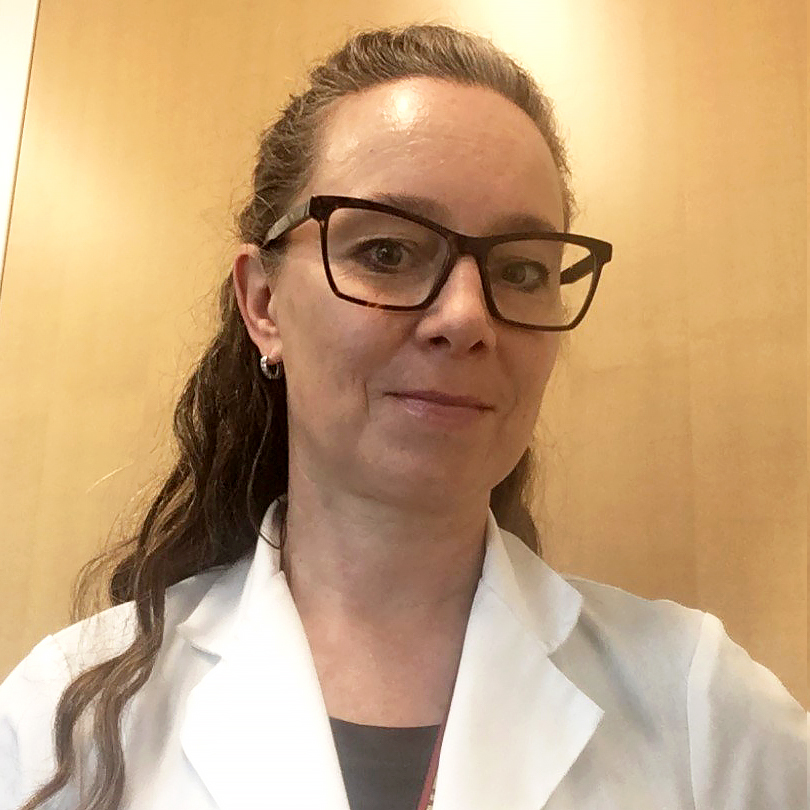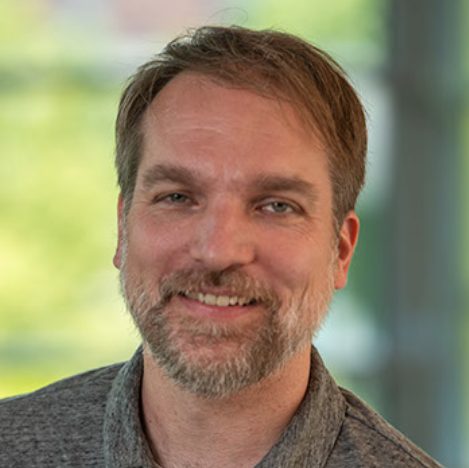More than 85 researchers from five different institutions around Colorado, including the University of Colorado School of Medicine, Colorado State University, and CU Boulder, gathered in the newly opened Anschutz Health Sciences Building on the CU Anschutz Medical Campus on August 19 for the 2022 Genome Regulation Summer Symposium.
Genome regulation encompasses all facets of how our genetic material — our DNA — is used. Genome regulation includes everything from biochemical changes that affect how genes get turned on and off to the physical arrangement and integrity of chromosomes. Genome regulation programs control which proteins are produced, and to what level — a fundamental process that can go awry in diseases such as cancer. The symposium highlighted the latest research in these areas by CU scientists.
 Materials for attendees at the Genome Regulation Summer Symposium.
Materials for attendees at the Genome Regulation Summer Symposium.
“We have people at these different institutions with like-minded but not identical overlap as far as what their research focuses on,” says Aaron Johnson, PhD, associate professor of biochemistry and molecular genetics, who organized the conference with Emma Robinson, PhD, a postdoctoral fellow in the Division of Cardiology, along with fellow CU Cancer Center members Srinivas Ramachandran, PhD, assistant professor of biochemistry and molecular genetics, and Catherine Musselman, PhD, assistant professor of biochemistry and molecular genetics.
“There’s an exchange of ideas that happens at these meetings, especially when you have people studying the same molecular pathways from very different approaches coming together,” Johnson continues. “Being able to create that cross-pollination is what we're going for. We are lucky in Colorado that we have so many different researchers working in this field.”
The cancer connection
Genome regulation is an important area in cancer research, as cancer often results when genes malfunction and improperly turn on or off functions meant to protect cells from tumor activity. At the CU Cancer Center, genome regulation is part of the Molecular and Cellular Oncology Program (MCO), home to researchers who provide insights into gene expression regulation and its deregulation in cancer, the cellular response to genomic insults, the molecular structure of cancer-relevant proteins, and new signaling processes driving tumor growth. The MCO was the cancer center program that helped to support the symposium.
“The research presented ranged from basic structural biology to people who study gene regulation in cancer and heart disease,” says Patricia Ernst, PhD, co-leader of the MCO. “Gene regulation is a way of understanding all sorts of diseases, and the MCO sponsored the conference to support the intellectual cross-fertilization between these different types of researchers since gene regulation is invariably affected in cancer.”
From med students to Nobelists
The Genome Regulation Summer Symposium included scientific presentations from members of prominent laboratories in Colorado including a trainee from the lab of Nobel Prize-winning chemist Thomas Cech at CU Boulder and guest speaker Michael Keogh from North Carolina-based bioscience company EpiCypher. Speakers shared their latest data and technical advances in the study of gene regulation and chromatin function, followed by interactive discussions with the audience members.
 Attendees learn about histones.
Attendees learn about histones.
During a lunchtime poster session, 21 early career investigators presented their research to peers and senior investigators. Winners included CU medical students Eli Martz and Giovana Breda Veronezi and CU postdocs Alexis Zukowski and Nicole Nuckolls.
The event received generous support from the CU Cancer Center, the CU Department of Biochemistry and Molecular Genetics, Active Motif, and the Consortium for Fibrosis Research and Translation (CFReT).





